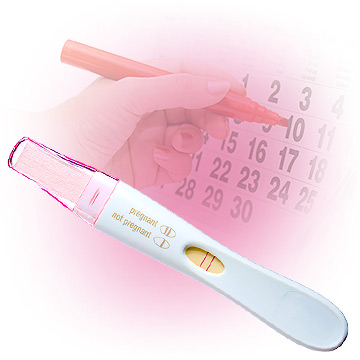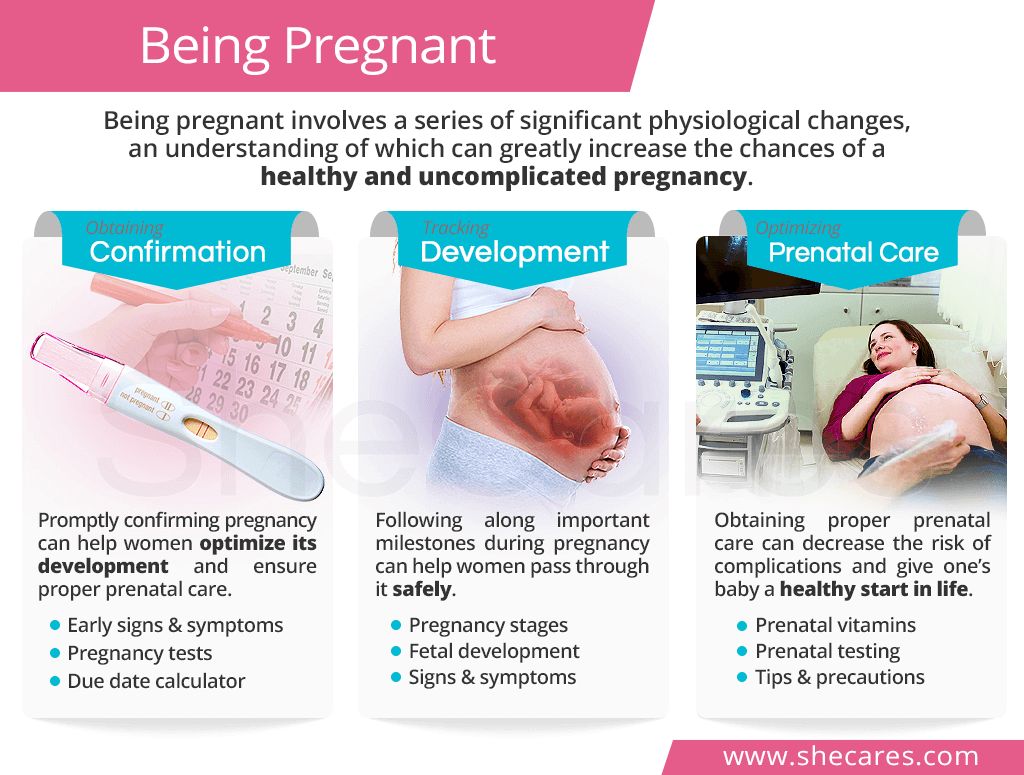Pregnancy Confirmation

The moment a woman realizes she is having a baby is undoubtedly memorable. The first realization usually occurs by noticing one of the most common early signs and symptoms of pregnancy, which is then followed by taking a pregnancy test for final confirmation.
Early Signs & Symptoms of Pregnancy
Rapid hormonal changes guiding conception bring about a variety of early pregnancy signs and symptoms, which can become noticeable as early as the first weeks after having unprotected sex.
Most common early pregnancy symptoms include the following:
- Missed period
- Morning sickness
- Breast tenderness
- Implantation bleeding
- Fatigue
- Sensitivity to smell
Whereas, the major early sign of being pregnant is the level of a hormone, human chorionic gonadotropin (hCG), which is only released during pregnancy and exceeds 25 mlU/mL.
Pregnancy Tests & Results
Even though various early pregnancy discomforts are a good indication that a woman is expecting, the unbeatable confirmation that conception has indeed taken place is obtained by taking a pregnancy test.
Urine pregnancy test, which can be taken at home or at a medical clinic
Blood pregnancy test, which can only be taken at a medical clinic
The two kinds of pregnancy tests commonly used both work by detecting the presence of hCG. They are the most accurate when taken about seven to ten days after a missed period.
Pregnancy Development

During the nine months of pregnancy, a woman undergoes major physiological changes triggered by hormonal fluctuations that govern and support fetal development.
Due Date Calculator
One of the first things a woman asks when she finds out she is having baby is when is her expected due date. Despite common belief, gestational age (a measure of how far along the pregnancy is) is not calculated from the date of a woman's ovulation. Instead, it is calculated from the first day of a woman's last period.
Pregnancy Stages
Pregnancy, also called gestation, spans about 40 weeks, which are divided into three pregnancy stages, called trimesters. As the name suggests, each trimester lasts around three months. They are as follows:
First trimester covers weeks 1 to 12 and starts from the first day of the last menstrual cycle
Second trimester covers weeks 13 to 27
Third trimester covers weeks 28 to 40 and ends with childbirth
It is important to note that in the first week or two of gestation, a woman is not actually pregnant yet. Depending on the length of the cycle, most women ovulate about two weeks before the next expected period, which is the only time when conception can ever take place.
Fetal Development
Each month of pregnancy that goes by brings about memorable milestones in the baby's life in the womb. Fetal development has its own rhythm and is divided into three stages:
Germinal stage (weeks 2 to 4), during which the fertilized egg rapidly multiplies as it moves down the fallopian tube to the uterus for implantation
Embryonic stage (weeks 5 to 9), which is the most critical time for a baby's development as most of his or her organs are formed; after week 5, the baby's heartbeat can be detected
Fetal stage (week 10 until birth), which is the longest of all stages; around week 14, the baby's gender can be identified; after week 23, the baby has a chance of survival if born prematurely
Pregnancy Signs and Symptoms
Through the various stages, a woman will likely report a variety of pregnancy signs and symptoms. Although each personal experience is different, the most commonly reported pregnancy discomforts include the following:
- Headaches
- Swollen feet
- Acid reflux
- Lower back pain
- Acne
- Frequent urination
Yet one of the most noticeable signs of being pregnant is the growing belly and the associated pregnancy weight gain, which is recommended to range from 25-35 lbs. (11-16 kg) for women of normal weight. This recommendation differs in the case of multiple gestation.
Keep reading for more interesting events in pregnancy development or continue to the next section to learn more about obtaining the best prenatal care.
Prenatal Care

Prenatal care, also known as antenatal care, is the medical care that a woman receives during pregnancy. Along with her wholesome lifestyle choices, it is aimed at lowering the risk of pregnancy complications and ensuring a healthy pregnancy.
First Prenatal Visit
The first prenatal visit with one's OBGYN is usually scheduled around week 8 of gestation. It is a thorough check-up, including a pelvic exam, blood test, and a review of one's medical history, including past pregnancies, sexually transmitted diseases (STDs), and family history, all of which can affect the baby's development.
Prenatal Vitamins
Once it is confirmed a woman is having a baby, her doctor will recommend her to start taking prenatal vitamins right away. Among other vitamins and minerals, these supplements contain adequate amounts (400mcg) of folic acid, a form of vitamin B9 which has been found to decrease the risk of neural tube defects, which happen in early pregnancy.1
Prenatal Testing
A pregnant woman will undergo numerous tests to check on her health and the baby's development as well as catch potential abnormalities early on. Besides pelvic exams, weighing, and blood pressure checks, prenatal testing includes the following procedures at specific points during pregnancy:
Pregnancy ultrasounds, including gender reveal scan
Prenatal genetic testing, like amniocentesis or chorionic villus sampling
Healthy Pregnancy Tips
Besides regular doctor's check-ups and supplements, how to stay healthy during pregnancy can be as easy as implementing the following tips to give oneself and the baby well-rounded care:
Understandably, there is also a long list of the don'ts of pregnancy, including not drinking alcohol or smoking cigarettes, avoiding harmful chemicals, and skipping out on raw fish or unpasteurized milk.
Keep on reading for a broader understanding of the specifics on good prenatal care.
Conclusions
Without question, pregnancy is one of the most memorable phases in a woman's life. However, with being pregnant comes a great responsibility. Although sometimes unforeseen complications happen due to chance and regardless of a woman's life choices, studies have shown that timely implemented prenatal care is the most important factor in ensuring a healthy and uncomplicated gestation. Equipping oneself with knowledge about pregnancy and the stages of fetal development can help an aspiring mother be more conscious of the effects of her everyday decisions on the baby's health. In no time, she will celebrate the fruits of her efforts as she gives birth to a healthy and beautiful baby.
Sources
- American Pregnancy Association. (2018). Human Chorionic Gonadotropin (hCG) The Pregnancy Hormone. Retrieved June 10, 2019 from https://americanpregnancy.org/while-pregnant/hcg-levels/
- Eunice Kennedy Shrive National Institute of Child Health and Human Development. (2017). About Pregnancy. Retrieved June 10, 2019 from https://www.nichd.nih.gov/health/topics/pregnancy/conditioninfo
- March of Dimes. (2017). Prenatal tests. Retrieved June 10, 2019 from https://www.marchofdimes.org/pregnancy/prenatal-tests.aspx
- Mayo Clinic. (2018). Prenatal vitamins: Why they matter, how to choose. Retrieved June 10, 2019 from https://www.mayoclinic.org/healthy-lifestyle/pregnancy-week-by-week/in-depth/prenatal-vitamins/art-20046945
- Mayo Clinic. (2019). Symptoms of pregnancy: What happens first. Retrieved June 10, 2019 from https://www.mayoclinic.org/healthy-lifestyle/getting-pregnant/in-depth/symptoms-of-pregnancy/art-20043853
- Medline Plus. (2019). Pregnancy. Retrieved June 10, 2019 from https://medlineplus.gov/pregnancy.html
- Planned Parenthood. (n.d.). Pregnancy Information. Retrieved June 10, 2019 from https://www.plannedparenthood.org/learn/pregnancy
- Office on Women's Health. (2019). Stages of Pregnancy. Retrieved June 10, 2019 from https://www.womenshealth.gov/pregnancy/youre-pregnant-no-what/stages-pregnancy
Footnotes:
- CDC. (2022). Folic Acid. Retrieved August 30, 2022 from https://www.cdc.gov/ncbddd/folicacid/about.html
